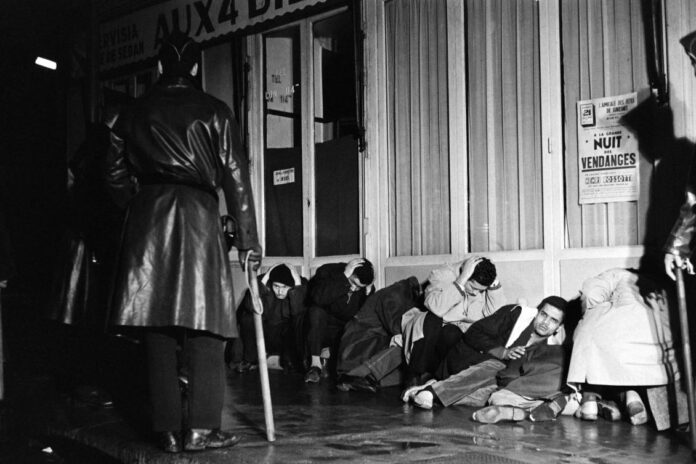PARIS: Djamila Amrane was a young mother in 1961 when she attended a Paris demonstration that would be targeted by what many historians consider to be post-war Europe’s deadliest police violence.
The rally was called in the final year of France’s increasingly violent attempt to retain Algeria as a north African colony, and in the middle of a bombing campaign targeting mainland France by pro-independence militants.
Algerians living in Paris were urged to gather in the center of the capital, dressed in their best clothes and with their children, for what was billed as a peaceful march against repression. Amrane, then in her late 20s, took her newborn baby.
But as night fell, witnesses recall seeing people shot with live ammunition and others killed when police charged into the crowd armed with thick wooden sticks and batons.
The final death toll is still unknown, but historians agree it was at least several dozen and possibly several hundred.
Amrane, who was a member of the pro-independence FLN group, was one of the estimated 30,000 people who turned out at dusk, but she sensed danger from the start.
“Some women I asked to come had got dressed up as if they were going to a party,” she said. “But I knew what we risked. I wanted to be able to run,” she told AFP in an interview.
The events of 17 October 1961 were covered up for decades, but the 60th anniversary of the atrocity, this Sunday, has led to fresh calls for more public recognition.
Campaigning is being driven by new generations of French people from immigrant backgrounds who want a more public reckoning with the crimes of the colonial era — a demand also made by the recent Black Lives Matter movement.
Efforts by centrist President Emmanuel Macron to “look our history in the face,” notably via a landmark report in January into France’s occupation of Algeria, have also helped break taboos around the issue.
Amrane is hoping that, as the first president born in the post-colonial era, Macron will go further than his predecessor Francois Hollande, who acknowledged in 2012 that protesting Algerians had been “killed during a bloody repression.”
Campaigners want an apology, reparations for the victims, or recognition that the repression constituted a state crime.
“It’s about time, no?” said Amrane, now aged 87.
The protests were called in response to a strict curfew imposed on Algerians to prevent the underground FLN resistance movement from collecting funds following a spate of deadly attacks on French police officers.
Algerians in France at the time were frequent victims of police roundups and harassment, but the violent repression of the demonstration was of a different order.
Witnesses say the live ammunition started shortly after protesters emerged from metro stations. Others suffered serious head injuries when police charged into the crowd.
Some of the worst violence occurred on the Saint Michel bridge near the Notre-Dame cathedral where police were seen tossing Algerians into the river Seine where an unknown number of them were lost to the currents.
This gave rise to the famous graffiti — “We drown Algerians here” — which was scrawled across the bridge and later became the title of a book on the events of that day.
“There was a state cover-up, a state lie. There were government statements from the morning of October 18 that sought to incriminate the FLN and the Algerians,” historian Emmanuel Blanchard told AFP.
The Paris police chief at the time, Maurice Papon, was later found to have collaborated with the Nazis during World War II.
Macron is expected to be wary about provoking a backlash from political opponents or the French police on Sunday when he will acknowledge the anniversary.
He is expected to seek re-election next year, and France’s colonial history and the issue of racially motivated police violence remain both divisive and bitterly contested.
His far-right electoral opponents, nationalists Marine Le Pen and Eric Zemmour, are outspoken critics of efforts to acknowledge or show repentance for past crimes.
Another complication is an ongoing diplomatic row between Paris and Algiers.
“Emmanuel Macron will probably look for a compromise,” Blanchard said.
This will not be enough to satisfy campaigners, or survivors like Amrane.
She said she might have died that night, or lost her two-month-old baby, had a blonde-haired French woman not opened her front door and dragged her in off the street.
As she remembered others who were not so lucky, her throat tightened and her voice tailed off.
“My memories are very clear, but I try to forget them,” she said.

